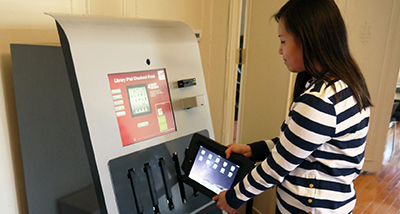iPad vending machines? Drexel University might just be onto something.
Students and faculty of Drexel University in Philadelphia, aren’t strangers to innovation, being the first US university to pioneer MacBook vending machines that allow university staff and students to lease devices up to 24 hours, directly from a dispensing device, no different in working principle as a soda machine.

Most recently, a recent partnership between Drexel and the Free Library of Philadelphia, has introduced iPad-dispensing machines, as well.
Each kiosk is loaded with as many as 12 Apple iPad devices, and each one can be rented for up to four hours. Each iPad that is returned to the kiosk goes through a factory wipe, for good measure.
Drexel is piloting the initiative with a single kiosk, for starters, located in the Dana Dornsife Center for Neighborhood Partnerships, which will be available to students and local residents.
The apps available on the devices have been carefully selected by university staff, and center around digital literacy for children, teens and adults. The applications range from art, digital storytelling and early literacy, to more advanced subjects, like news, photo editing, science and astronomy.
“Based on the success of the laptop lending kiosk in our library, self-service technology has proven to serve as an easy, attractive option for access to items we know our library users want...” commented University dean of Drexel University, Danuta A. Nitecki.
iPad vending machines are certainly a great idea on university grounds, but how well would they fare in public retail?
On a hunch, we can see at least three big concerns in relation with these types of kiosks:
First of all, while self-serve kiosks, dispensing items ranging from Android tablets, to other miscellaneous gadgets, have made sporadic appearances at Safeway locations in the past couple of years, as well as in other settings, side-by-side DVD rental kiosks, however durable these kiosks are, high concerns in the realm of theft and vandalism, have hindered the proliferation of these medium-ticket-item dispensers, and unless manufacturers can provide adequate guarantees, matching those of automatic teller machines for banking, the chances of purchasing expensive electronics through a slot, are very slim.
Next, the security concerns are also high-up on the list. Kiosks of this kind simply cannot be placed in publicly available settings, like parking lots or shaded areas, even in the safest of neighborhoods. The chance of break-ins and vandalism would mean prohibitive insurance rates, due to high-liability factors.
Finally, while no robber would waste time assaulting a patron trying to purchase a beverage, a consumer looking to buy electronics from a vending machine in public, would make far too tempting a target, most likely resulting in bolder attacks, even in plain daylight.
At any rate, we can’t take away from the fact that what Drexel University is doing is unique and represents a great example for other educational institutions to follow. Digital literacy has become a priority, as industries set higher bars in regard to requirements for current and future hires.